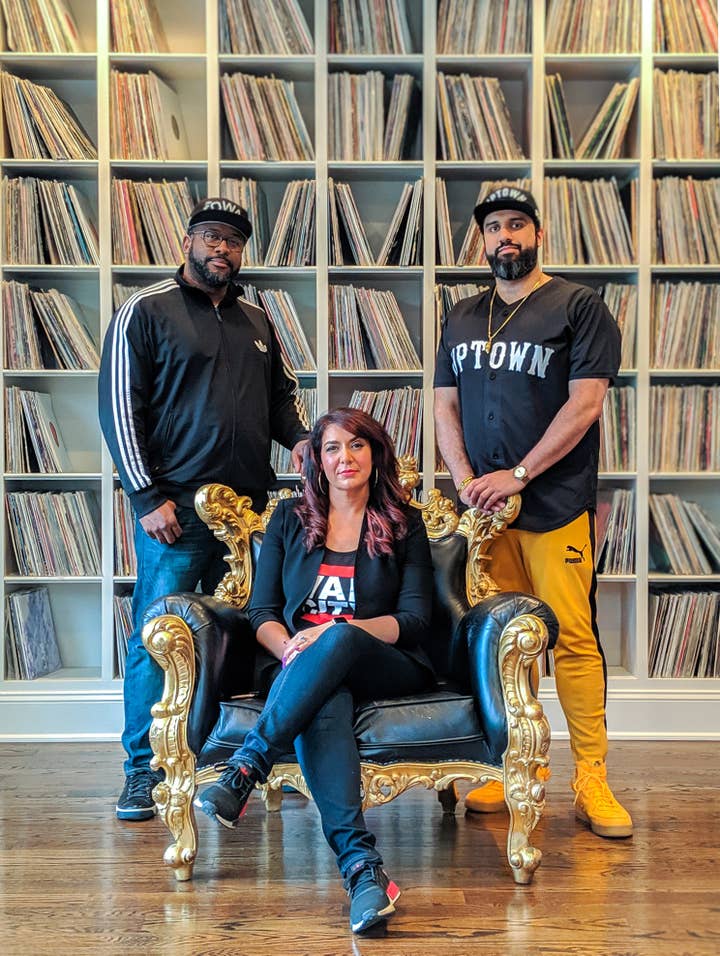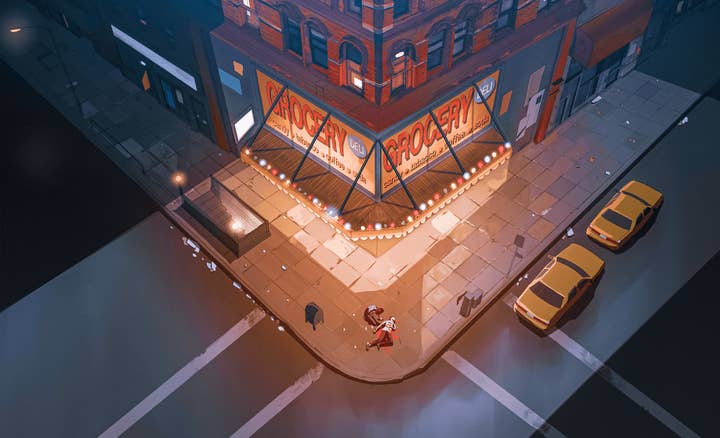Brass Lion Entertainment and the critical business of diversity
Manveer Heir, Bryna Dabby Smith, and Rashad Redic on why their focus on diverse games is both a business decision and a human one
After years of pushing for more diverse voices, characters, and games from within major studios like Raven Software and BioWare to little avail, Manveer Heir decided instead to lead by example.
"The entire time I've been in the industry I've always cared about diversity and wanted to see more diverse voices and characters," he tells GamesIndustry.biz. "I kept trying to push that from within inside the big companies, and because of large structural issues in tech and the way companies work it was really difficult. I upset some people by doing that. And I realized, instead of making this change from within, I'd rather start a studio that is the kind of place I would have liked to work at my entire career."
In 2017, that's exactly what he did. Though he started on his own, Heir later teamed up with Bryna Dabby Smith, a veteran of EA and High Moon Studios and Rashad Redic, formerly of Bethesda and Crytek, to start Brass Lion Entertainment -- a "diverse and inclusive entertainment studio" dedicated to making games centered around protagonists of color.
"I realized, instead of making this change from within, I'd rather start a studio that is the kind of place I would have liked to work at my entire career"
Manveer Heir
To start, Brass Lion is working on a game called Corner Wolves, which takes place in Harlem in the '90s and has at its center an Afro-Latina protagonist named Jacinte. Jacinte must unravel the mystery surrounding her father's murder at the start of the game, while navigating the complex cultural, ethnic, and political situations inherent to its historical setting -- a key component of what Heir and the team want to accomplish with its games.
"As a gameplay designer, I find building systems in RPGs really interesting and fun and a good way to mimic a world and how it works," Heir says. "But the systems in the real world have things like racism and sexism embedded in them. How do you build an RPG that embeds levels in racism into the actual systems, that your character has to overcome those or deal with the ramifications of those?
"That's something I don't feel enough RPGs or games in general are doing, so I started from that angle, and from there we got to Corner Wolves."
Though Heir, Smith and Rashad all have their own connections to that era and their own experiences as marginalized individuals, they acknowledge that none of them are specifically Afro-Latina. For that reason, they emphasize the importance of not just doing research and reading on the experiences of the groups who are represented in their games, but also involving members of that community in the game's creation at multiple levels.

"We've been [reading lots of history], talking to people who grew up in New York at the time, talking to folks and hearing stories, interviewing them, and pairing up with writers who are from the area and can offer more authenticity," Heir says. "Then once we are in the stage where we have more scripts and everything laid out in much more detail, my goal is to take that around, especially to Afro-Latinas, and have them review that and tell us about the little things: What would the poster be on this girl's wall? What is the music that would be playing in the house at night when you come home?
"We're all people from these cultures; we're all connected to these folks. We start reaching out and we're usually one introduction away from getting answers."
Redic adds: "It's a no-brainer to reach back into the cultures you're talking about."
At multiple points during our chat, Smith references the recent success of films with diverse protagonists at the center, specifically naming Black Panther and Crazy Rich Asians. She and the team are confident that blockbuster-level games with diverse characters made by diverse teams are not just a rare find in the industry and important for their own sake, but also an untapped font of market potential.
"In addition to it being a creative gap, there's also a really clear open market position that naturally will get occupied by good titles that fill that need," Smith says. "Whenever there is a need from an entertainment perspective or from a representation perspective, there are people who will spend money for that because it's important to them, or because it speaks to them. We feel very strongly that not only is it something that creatively and culturally is important, but it's also a business need we can fill."
"There is a lot of heart for what we're doing and there is a lot of belief, but that alone from the business perspective is not always enough of an argument"
Bryna Dabby Smith
Heir adds: "I think the next big games are going to have these new voices, because we're sitting on the same franchises for the last two console generations and very frankly I think a lot of them are getting very stagnant. Creatively, there's a lot of value in trying to find as many diverse stories as possible to tell.
"There were some great studies done a couple years ago...that found diverse teams are a little bit more uncomfortable, because they aren't homogeneous. They have to check each other's biases and walk each other through because they don't have the same perspective. But, by doing that, they're becoming a more fast-moving team that can handle difficult choices better than homogeneous teams. And we think a combination of a diverse team as well as a diverse product into a marketplace that is under-served will lead to a lot of success."
Heir and Smith both touch on a point that came up in Brass Lion's initial studio announcement -- the need to justify diverse games from a business standpoint. I ask Smith why this is important to the team to be particularly vocal about, and why the more human reasons for diverse games aren't enough to sway backers.
"When you're out there having conversations with business people, you are reminded very quickly that games are a business," Smith says. "And they're looking to make money off what you're doing and that's the reason why people will fund you. There is a lot of heart for what we're doing and there is a lot of belief, but that alone from the business perspective is not always enough of an argument. The fact that enough people have that heart, that there is a business need, is what gets us where we need to go."

Heir adds: "I don't think there is another indie studio that is doing what we're doing at the goal size we want to get to -- we want to be a mid-tier-sized indie. It would be easy for the three of us to go and make a small indie game for under a million dollars on our own, and it might sell well or it might not, and there's nothing wrong with the teams that do that. However, I think there's a need for a larger business, a corporation to come in and show that you can make good, long-term business planning around this, and that there is good money to exist here.
"I want us to do well and be number one in this area, but I also want other studios to start having to build teams in the same vein. I want the industry as a whole to diversify...because they're not going to do the work on their own. What I've learned working at all these large studios is they don't understand or don't care much of the time, so it's up to us to lead the way."
"The beginning of diversity in our industry is going to start with reaching out to more than just the usual suspects for education"
Rashad Redic
Heir and Smith confirm that their ambitions are indeed to eventually be a larger studio, but Smith adds that they don't want to fall into the trap they've seen elsewhere of growing too quickly to be sustainable. But eventually, Brass Lion wants to be in a position to have multiple teams working on multiple games at once, with a new game every year or two. And while its first project is looking mostly at racial diversity, the team also wants all of its titles to be able to explore gender, sexuality, cultural, and other types of diversity as well.
For now, though, Brass Lion is just the three founders working full-time remotely alongside a few contracted positions. With time they hope to establish a physical studio in New York, as well as a satellite office in Montreal to take advantage of tax incentives. Long-term, they hope to have a team with both the development chops to create AAA-level experiences and the diverse backgrounds and experiences to tell a wide array of representative stories.
"Diversity starts with hiring," Redic says. "Where you look for talent and how you look for it has to be a little bit different than the usual way people go about hiring. Most of the AAA companies don't really dig deep into their communities as well as they could, and I think that's one of the things that's creating a barrier of entry for a lot of other people. Their route to becoming a designer or an artist or whatever is going to be different.
"I know that from experience. I grew up in Oakland, California during a really rough time when the murder rate was pretty high. I knew I wanted to make games, but I didn't know how to go about turning that into a career. I didn't really have a computer, so it ended up being that a mentor of mine reached out and said you have this talent and ability, let me help you refine that and polish that and turn it into something.
"I can't think of any of the really big companies that have thousands of people taking that route to find these diamonds in the rough. They go to the major colleges and stuff like that, and that's where it stops. The beginning of diversity in our industry is going to start with reaching out to more than just the usual suspects for education."
Heir adds: "And once those people are inside the studio, it's actually creating roles for them that they can grow into. It's not good enough just to get women and people of color into the studio and then just keep them at entry-level jobs and burn them out. It's important to create leadership opportunities. Growing the people when they're in, doing things publicly so they're publicly a beacon of light in an industry that isn't always that way for many of us. Those things are important, and it's extra pressure, but I think it's going to be worth it at the end."
Smith concludes: "I think we've all had experiences where we've been the 'only' in the room. So we realize how important it is to see yourself represented as you start in the industry, and also as you grow. For me, the more senior I got, the more likely I was to be the only woman, or the only 'other,' or the only women and the only 'other' in any particular room. You have to get comfortable in any environment, but I'd love for little me or little Rashad or little Manveer to see ourselves and know what we can grow into. And I think the younger we start in terms of showing them that representation, the better."
